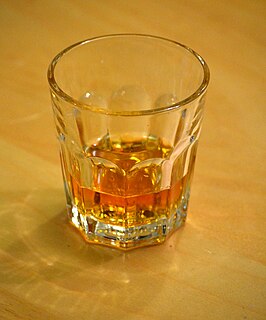
Whisky or whiskey is a type of distilled alcoholic beverage made from fermented grain mash. Various grains are used for different varieties, including barley, corn, rye, and wheat. Whisky is typically aged in wooden casks, which are often old sherry casks or may also be made of charred white oak.

Bourbon is a type of American whiskey, a barrel-aged distilled liquor made primarily from corn. The name derives from the French Bourbon dynasty, although the precise inspiration is uncertain; contenders include Bourbon County in Kentucky and Bourbon Street in New Orleans, both of which are named after the dynasty. The name "Bourbon" was not applied until the 1850s, and the Kentucky etymology was not advanced until the 1870s.

The Whiskey Rebellion was a violent tax protest in the United States beginning in 1791 and ending in 1794 during the presidency of George Washington, ultimately under the command of American Revolutionary War veteran Major James McFarlane. The so-called "whiskey tax" was the first tax imposed on a domestic product by the newly formed federal government. Beer was difficult to transport and spoiled more easily than rum and whiskey. Rum distillation in the United States had been disrupted during the Revolutionary War, and whiskey distribution and consumption increased after the Revolutionary War. The "whiskey tax" became law in 1791, and was intended to generate revenue for the war debt incurred during the Revolutionary War. The tax applied to all distilled spirits, but consumption of American whiskey was rapidly expanding in the late 18th century, so the excise became widely known as a "whiskey tax". Farmers of the western frontier were accustomed to distilling their surplus rye, barley, wheat, corn, or fermented grain mixtures to make whiskey. These farmers resisted the tax. In these regions, whiskey often served as a medium of exchange. Many of the resisters were war veterans who believed that they were fighting for the principles of the American Revolution, in particular against taxation without local representation, while the federal government maintained that the taxes were the legal expression of Congressional taxation powers.

Irish whiskey is whiskey made on the island of Ireland. The word 'whiskey' comes from the Irish uisce beatha, meaning water of life. Irish whiskey was once the most popular spirit in the world, though a long period of decline from the late 19th century onwards greatly damaged the industry, so much so that although Ireland boasted at least 28 distilleries in the 1890s, by 1966 this number had fallen to just two, and by 1972 the remaining distilleries, Bushmills Distillery and Old Midleton Distillery, were owned by just one company, Irish Distillers.
A blended whiskey is the product of blending different types of whiskeys and sometimes also neutral grain spirits, colorings, and flavorings. It is generally the product of mixing one or more higher-quality straight or single malt whiskey with less expensive spirits and other ingredients. This typically allows for a lower priced finished product, although expensive "premium" varieties also exist.
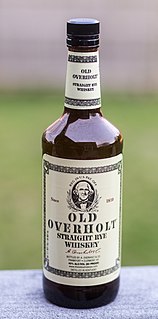
Rye whiskey can refer to two different, but related, types of whiskey:

Tennessee whiskey is straight whiskey produced in the U.S. state of Tennessee. Although it has been legally defined as a bourbon whiskey in some international trade agreements, most current producers of Tennessee whiskey disclaim references to their products as "bourbon" and do not label them as such on any of their bottles or advertising materials. All current Tennessee whiskey producers are required by Tennessee law to produce their whiskeys in Tennessee and – with the sole exception of Benjamin Prichard's – to use a filtering step known as the Lincoln County Process prior to aging the whiskey. Beyond the perceived marketing value of the distinction, Tennessee whiskey and bourbon have almost identical requirements, and most Tennessee whiskeys meet the criteria for bourbon.

Heaven Hill Distilleries, Inc. is a private, American family-owned and operated distillery founded in 1935 and headquartered in Bardstown, Kentucky, that produces and markets the Heaven Hill brand of Kentucky Straight Bourbon Whiskey and a variety of other distilled spirits. Its current distillery facility, called the Heaven Hill Bernheim distillery, is in Louisville, Kentucky. It is the seventh-largest alcohol supplier in the United States, the second-largest holder of bourbon whiskey inventory in the world, the largest, independent, family-owned and operated producer and marketer of distilled spirits in the United States, and the only large family-owned distillery company headquartered in Kentucky.
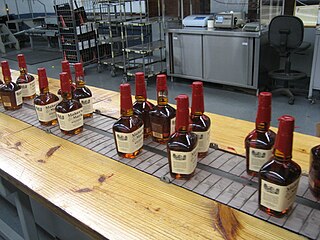
American whiskey is whiskey produced in the United States. The primary types of American whiskey are bourbon whiskey, rye whiskey, rye malt whiskey, malt whiskey, wheat whiskey, Tennessee whiskey, and corn whiskey. All of these are made from mashes with at least 51% of their named grains.
Straight whiskey, as defined in United States law, is whiskey that is distilled from a fermented cereal grain mash to a concentration not exceeding 80% alcohol by volume (abv) and aged in new charred oak barrels for at least two years at a concentration not exceeding 62.5% at the start of the aging process.
St. George Spirits is an artisanal distillery located in Alameda, California that produces a range of alcoholic beverages under the direction of Master Distiller Lance Winters. They are known for producing vodka, absinthe, whiskey, gin, brandy, liqueurs, and a range of exotic spirits.
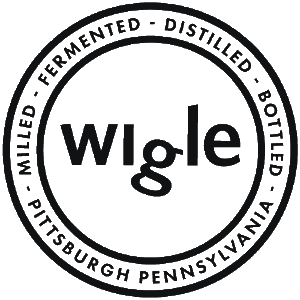
Wigle Whiskey|url=https://philly.thedrinknation.com/articles/read/8065-Wigle-Whiskey-Pennsylvanias-Rebellious-New-Spirit# |website=Drink Philly}}</ref>) is an artisan small batch whiskey distillery in the Strip District neighborhood of Pittsburgh. Wigle Whiskeys are the flagship products of the Pittsburgh Distilling Company, LLC, which is entirely family owned and operated.
The Pittsburgh Whiskey & Fine Spirits Festival is an annual festival celebrating whiskey and spirits in Pittsburgh, Pennsylvania. The festival is sponsored by the Pennsylvania Liquor Control Board. Contributions to the event benefit the National Multiple Sclerosis Society. The Pittsburgh festival follows a similar one in Philadelphia. The creation of the festival follows the success of the Pittsburgh Wine Festival. It was conceived as an "experiential marketplace for spirits." It was founded in 2007, amid growth in whiskey's popularity.

The Pittsburgh Wine Festival is an annual festival celebrating wine in Pittsburgh, Pennsylvania. The festival is sponsored by the Pennsylvania Liquor Control Board, which maintains an on-site wine shop. The Pittsburgh festival follows a similar one in Philadelphia.
Rye malt whiskey, under US regulations, is a whiskey produced via a mash primarily consisting of malted rye. It is distinct from rye whiskey due to the malting step, and is distinct from unqualified malt whiskey, which is made from malted barley, not rye.
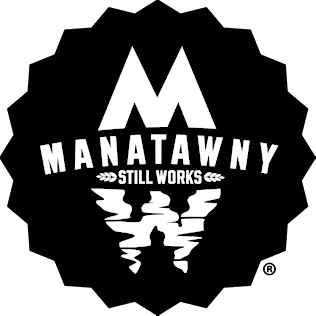
Manatawny Still Works is a maker of American whiskey, rum, and gin. It is produced in Pottstown, Pennsylvania along the bank of the Manatawny Creek.
Distillery 291 is a whiskey distillery in Colorado Springs, Colorado.

Tariff of 1791 or Excise Whiskey Tax of 1791 was a United States statute establishing a taxation policy to further reduce Colonial America public debt as assumed by the residuals of American Revolution. The Act of Congress imposed duties or tariffs on domestic and imported distilled spirits generating government revenue while fortifying the Federalist Era.
Tamworth Distilling is a small-batch distillery located in Tamworth, New Hampshire. The distillery is known for producing small batch spirits with local ingredients.










